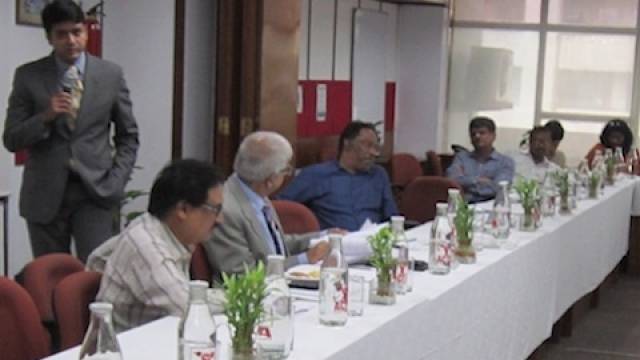The recent Executive Committee and Annual General Meeting of The All India Glass Manufacturers’ Federation (AIGMF) was held at the Paharpur Business Centre, LEED Platinum/BEE 5 star Building.
The venue was purposely chosen to introduce Green Buildings concept to its members and to also debate on use of glass in buildings as eco-friendly measure.
Mr. Barun Aggarwal, Director, BreatheEasy, a division of Paharpur Business Centre (PBC) gave a presentation on Introduction on Green Buildings.The talk was organised in collaboration with Paharpur Business Centre to brainstorm on the Indian government’s vision of smart/solar cities including how the Green Building concept could be adopted to improve people’s lives. Mr. Aggarwal spoke about BreatheEasy, an initiative that helps companies implement solutions for improving Indoor Air Quality while reducing energy consumption, contributing to overall cleaner, more pure air. His presentation covered following on glass application in buildings:
• Use of flat glass in doors and windows permits use of sun light and saves energy/power bills
• Use of glass in partitions saves wood and checks felling of forests
• Use of glass and glass products in Buildings is quite popular, especially with glass now turning from a fragile to a sturdy material i.e. toughened, noise or bullet resistant structure
• Glass is generally maintenance-free for the lifetime of a building
The session on green buildings was organised in addition to the presentation on GST- Challenges for the Businesses by Mr. Kabir Bogra, Partner (Indirect Tax) Khaitan & Co., to coincide with AIGMF meetings.
As a CSR initiative, AIGMF gifted 100 glass water bottles specially manufactured by Hindustan National Glass and Industries to Paharpur Business Centre to add to the green building concept. The bottles carry the logo of ‘Act India’, an initiative which aims at empowering people to demand responsible and safe packaging.
Mr. Arun Kumar Dukkipati, Sr. Vice President, AIGMF said, that glass containers made from cullet or weight reduction technology saves energy. Every ton of glass recycled saves 322KwH of energy, 246 kg of CO2 and 1.2 tonnes of virgin raw material. He also shared some of the main characteristics of glass:
• Glass is 100% recyclable – It does not lead to generation of any solid waste, thus saving land fill space. This is a major advantage from environment point of view in the present times, when municipalities are finding it difficult to find space to dump urban waste
- Glass is resistant to chemicals and solvent: It is used for packaging of chemicals and solvents as it does not react with them
- Glass ensures hermetic seal: It provides air tight packaging for products thus providing longer shelf life. It is the preferred product for vacuum and carbonation
- Glass is transparent: The customer can see the contents from outside the pack
- Glass has optimum recycling performance: It is a cradle-to-cradle packaging, meaning it can be recycled infinitely to be re-made into new bottles or jars as good as those manufactured by using fresh raw materials.
Mr. Dukkipati congratulated PBC for adopting use of glass bottles in its Green Building Business Centre, which is a step forward towards clean environment. He said that use of glass bottles complements the Prime Ministers’ vision of Swachh Bharat Mission (Clean India Campaign) as waste from other packaging material litters streets, drains, rivers, and the environment in general. With glass being 100% recyclable, it mostly reaches junk sellers for recycling and therefore adds to a cleaner environment.
Mr. Dukkipati concluded by saying that use of glass will make smart cities look more elegant, beautiful and eye-catching. Glass application will not only help buildings lit with natural and solar light but will also lead to huge monetary and energy savings for the economy.




